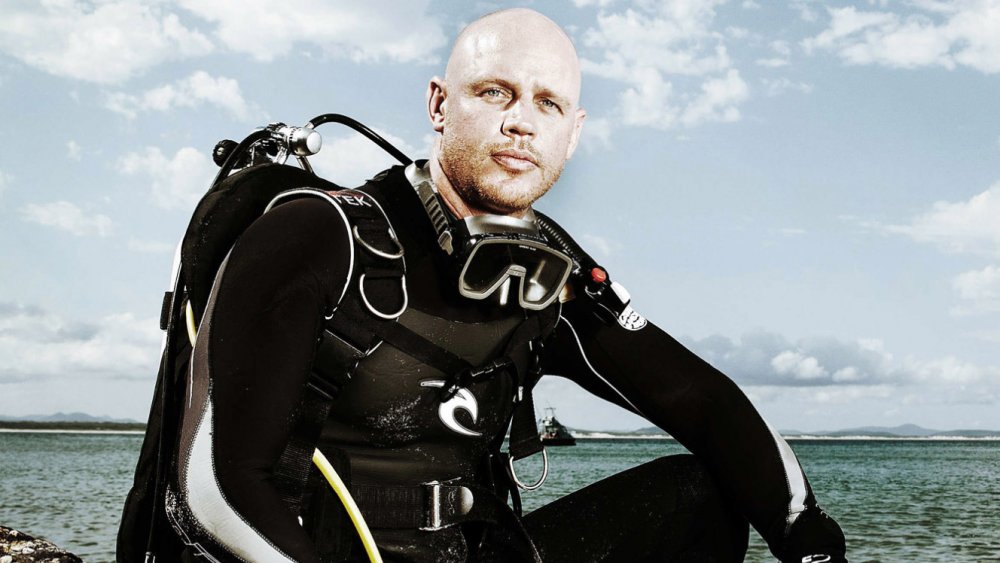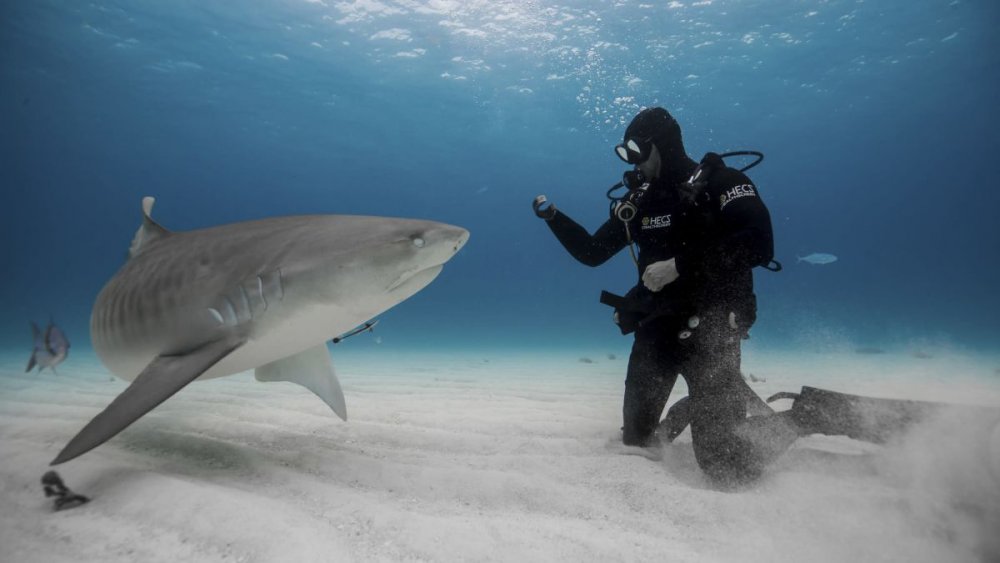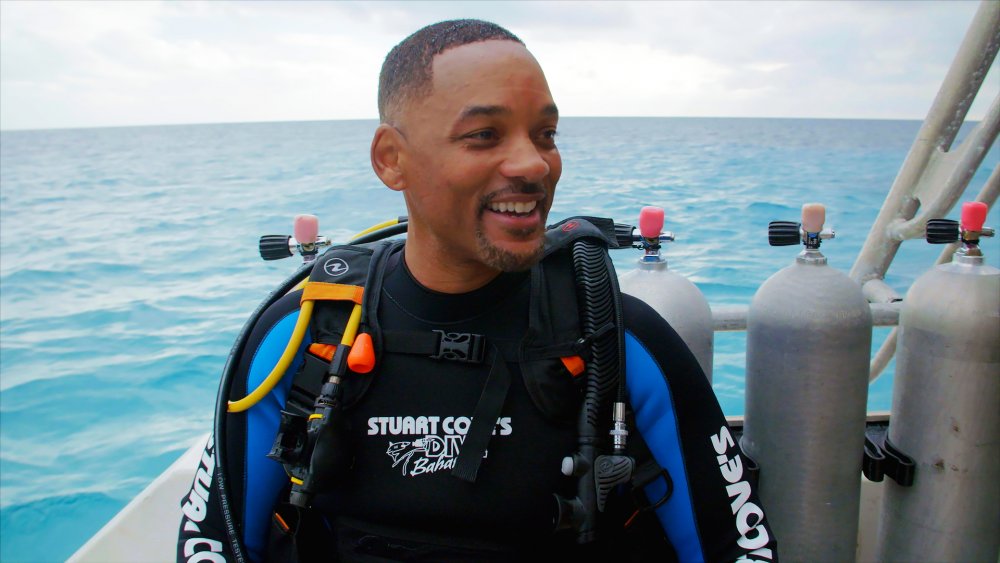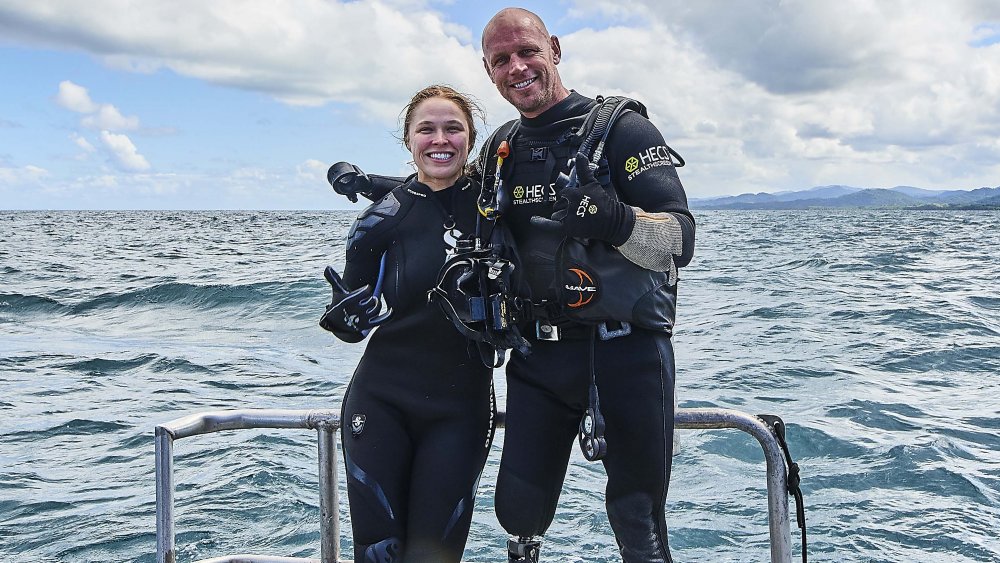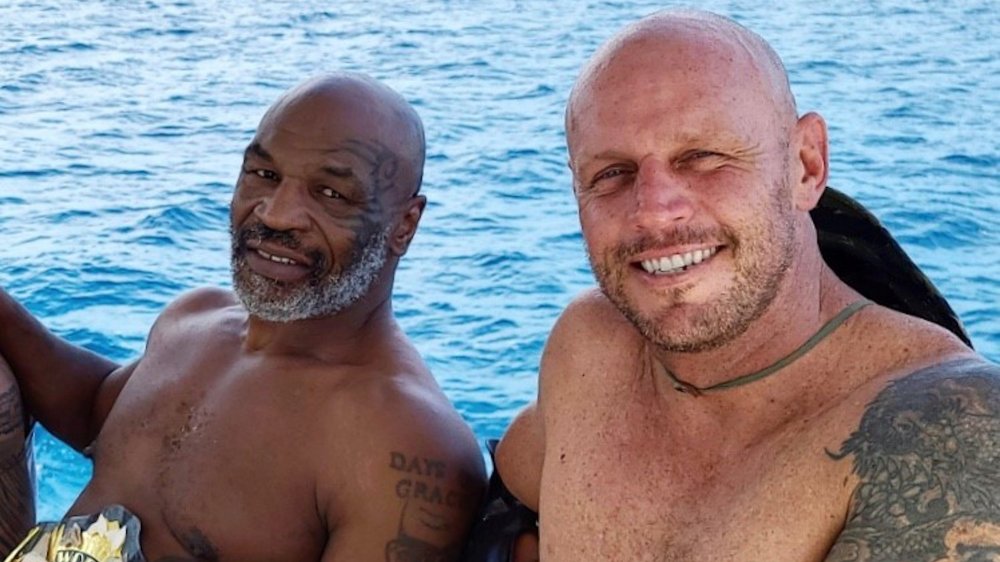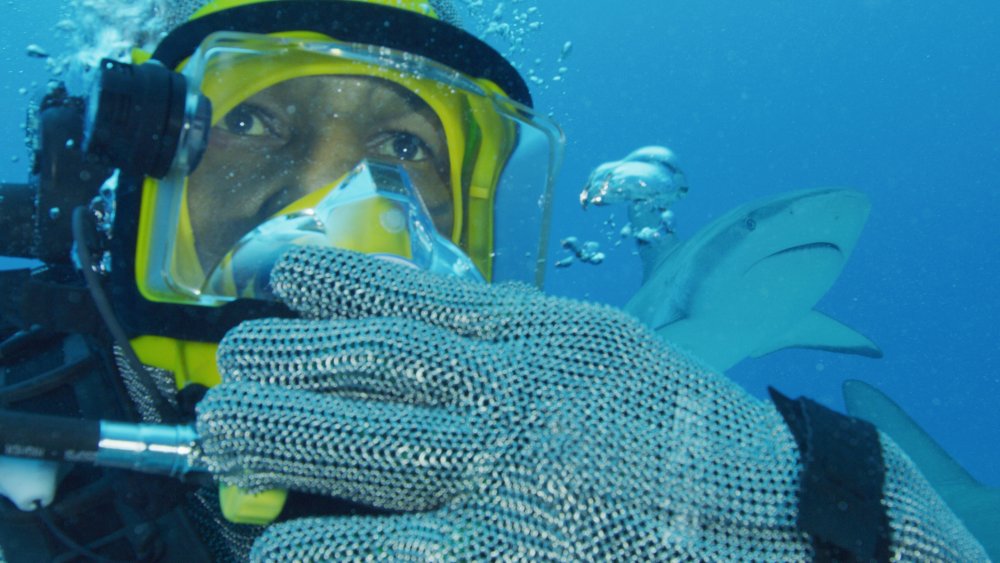Shark Week's Paul De Gelder On Working With Will Smith, Mike Tyson, And Ronda Rousey - Exclusive Interview
Paul de Gelder is a walking, talking (and swimming) testament to the power of perseverance and the freedom in understanding. A self-confessed "hoodlum" who worked his way from strip club bouncer to elite diver with the Australian Navy, de Gelder saw his wild lifestyle come to an apparent halt when a nine-foot bull shark took two limbs from him during an otherwise routine bomb disposal training exercise. Rather than swear off the ocean, de Gelder challenged himself to learn more about the apex predator and in the process became an advocate for sharks, an anti-poaching crusader, and a regular face on Discovery Channel's Shark Week programming.
In this exclusive interview with Looper, the vegan and motivational speaker talked about his story and explained what it was like training Will Smith (Will Smith: Off the Deep End), Mike Tyson (Tyson vs Jaws: Rumble on the Reef), and Ronda Rousey (2018's Ronda Rousey Uncaged) to overcome their fear of sharks. Shark Week 2020 is airing on the Discovery Channel through Sunday, August 16.
Paul de Gelder believes sharks have more to fear from humans than the other way around
Tracy Morgan's character on 30 Rock says "Live every week like it's Shark Week." What's your experience with the whole Shark Week phenomenon, and how did you get roped into it?
Well, it's been going on a whole bunch of years now. And it's like living in your dream where you get paid to travel the world, work with interesting people, and go diving and swimming with sharks. So what sort of life is this really? It's so bizarre, especially from where I came from. A troubled kid that was self-harming, depressed, fighting, stealing, doing drugs, to then Army Airborne, Navy clearance diver. And at the pinnacle of my game, living the dream, at Bondi Beach, riding a big black Italian sports bike, hanging out with my mates, jumping out of aircraft, shooting guns, and blowing stuff up. It doesn't get any better than that for a big kid like me. And then you turn up to work one day, a bloody shark eats you and tries to take it all away. Over a period of years, my fascination with sharks grew, not out of any morbidity, but more so partially because my shark attack was so widely publicized, everyone in Australia knew about it, that every time there was another shark interaction, the media would come to me for a comment. [Rather than sound] like a dummy on television, I figured, well, I'd go and do my research.
You'd like to know what you're talking about other than just "Yeah, it happened to me too."
Exactly. There's an old adage, "Knowledge dispels fear." There was only one thing I was more afraid of than sharks, and that's public speaking. But the more research I did, the more I realized how little we had to fear of sharks, and how much they have to fear from us through the amount of death we create on each other. [My] passion and comfort on camera, Discovery Channel picked up on that through an interview [and] gave me an opportunity to co-host. Now I get to live in the States, in beautiful California. I work with Discovery, getting to do three shows a year, which is awesome and just having more adventures and stories to add to that repertoire of my life.
I love that whole idea of charging forward into your fear. It seems counterintuitive, but it's so smart. You wouldn't think someone who suffered a shark attack becomes this expert shark diver, swimming with sharks, and knows everything about sharks. It seems like that's the best way, and a good lesson for lots of things in life. The more knowledge you have, the less fear you have.
There's nothing wrong with doing something when you're scared. I think that's something a lot of people put the brakes on. They get scared, so they don't do it. But what's the problem with being scared while you do it? That just builds character; it builds strength; you feel better about yourself. So never let fear stop you, use it as a motivator.
Will Smith had "get over my fear of sharks" on his bucket list
How did you come to work with Will Smith, and what was that experience like?
He was just a really, really nice guy. Very calm. Making you feel welcome and comfortable, which is hard to do around a living icon. I'm used to seeing these guys 10 feet tall on the cinema screen. All of a sudden, I'm walking down a pier next to him having a conversation. So very, very surreal. All happened through him wanting to overcome his fear. I'd worked with one of his producers in the past doing another show. And he said to her that one of his fears for his bucket list was diving with sharks. And so she goes, "Aha, I know the right person for this." So we organized to take him out to the Bahamas. I got to take all my own crew for the feeders, wranglers, and camera people. It was really cool to bring some friends to the project. And just see such an incredible shift, from fear to fascination, in Will, compared to when he was about to get in, to when he got out. He said it was the best thing that he's ever done in his life; nothing will ever top it. I think that's a great example of how, when you face your fears, sometimes they're not as bad as you think they are.
When Will was getting in the water, was there anything about the conversations ahead of time that surprised you, or that you hadn't heard before, or that was super unique about that experience?
Yeah, I guess we put these superstars on a pedestal a little bit because they've got all the money and all the fame, and we think maybe they've got it all worked out. But the human side of Will, having a conversation with him at the end of the pier about fear, death, overcoming adversity, and things like that, that really put a human element to this person. We get confused [about] how he is because he's played so many different characters.
You're like, "Am I with Mike Lowrey right now?"
Exactly. Seeing the human side, and the consideration for the things that I was trying to teach him about death and fear, I got a lot of respect for him from that, for being open to listening to just some guy to him, and being willing to pay attention to it, take it on board, and then utilize it as well.
Ronda Rousey's husband is not someone to disappoint
What can you tell me about working with Ronda Rousey and her husband, ex-UFC fighter Travis Browne?
Love those guys. They have remained friends to this day. Just the loveliest couple. They were just so in love. They couldn't keep their hands off each other; they were canoodling the whole time. It was really sweet to see. They're just very lovely people. Travis said to us, 'If my wife doesn't come back on this boat, ain't none of y'all [coming back] on this boat.'
Ronda is obviously a world champion. She picked up information; she processed it. She did everything we asked to keep her safe. And even though I was absolutely terrified of that last dive where she's about to feed the bull shark, I had to rely on the fact that I'd given her all the information I had, and she was just such an elite athlete that she knows how to do it, she knows how to maintain her safety. And it all panned out thank God, because I really didn't want Travis Browne, her husband, killing me when I got on the boat, and I didn't want her losing a hand, and I didn't want the sharks getting bad PR. So it all came together and worked out perfectly.
Whether it's Will Smith, Ronda Rousey, or the general public, what do you find are some of the biggest misconceptions about sharks?
Well, 90% of the media about sharks only comes out when someone's been attacked. There might be a little bit of sharks being sighted. And so that's why everyone has this preconception of thinking as soon as they get in the water with sharks, then they're going to attack. But then they see us get in, and the sharks aren't even interested, and it blows their mind. They think that sharks want to bite us, but it couldn't be further from the truth.
They're really not that interested at all in humans specifically. They're curious animals because they're always looking for opportunistic feeds, so they're going to go and explore things with their mouth, but that doesn't mean that they're attacking you. It just means that you can put your hand on their head, push them away, and they'll go, 'Okay, that's not food, that could be another predator, I'll look elsewhere.'
Seeing [folks like Will and Ronda] go from very nervous and tense to being able to just totally relax and enjoy the experience, that's probably the best thing about it.
So when a shark does bite someone, it's not out of hunger?
No, it's out of curiosity.
They're not trying to eat a person necessarily.
No, no, no. A lot of the time, it's mistaken identity. So if you go to the bottom of the ocean, you look up, you see something swimming on the surface, it's black, you've got a silhouette. Sharks are no different. They pick up on the flashing in the water from possibly a surfer. They'll go up and investigate, thinking that it's food. Other times, you've got people that are out spearfishing, and they're carrying a bunch of dead and semi-dead shark food. But we don't often think these guys probably weren't doing the exact right thing. You don't go to Africa and not worry about lions, and not take precautions. We know that there are dangerous animals in the ocean, not just sharks, many, and so we have to take responsibility for our actions and realize that we have to take every precaution we can if we want to stay safe. Sharks, completely separate to every other apex predator, will allow us to share that space with them. They're not mindless killers. Whereas you can't go up and scratch a bear behind the ear, or slap a lion in the face with a piece of steak; it'll rip your head off.
Mike Tyson was so nervous at first, he threw up
Being around you has got to be calming for people, knowing that you've suffered just about the worst thing that you can with a shark, and yet you're enthusiastic around them. You love them.
Or it goes the other way: they see the missing limbs, and they think that possibly that could happen to them. "I'm not going diving with this crazy dude who's already missing limbs and goes swimming with sharks!" I'm like, "Well look, I haven't been bitten since then. And now I know a lot more."
I once interviewed another shark survivor, Bethany Hamilton.
I know Bethany.
I would imagine it's a small community of shark attack people, right?
Yeah. The funny thing is, barely any of them blame the shark. Most of the time, we're ocean people, we understand the risks, and either we accept them, or we don't. But fortunately, most people do.
You've worked with another all-time great athlete, Mike Tyson. What can you tell me about Iron Mike? I believe he's vegan, too. Unless that's changed?
Oh, I don't believe he's vegan. I know that because I'm vegan.
Ah, okay. Well, he was at one time.
He might have been dipping his toes into the world. I saw that he did an interview about it. But I know the guy that does his nutrition, and he's definitely not totally vegan. He eats predominantly vegetables, but yeah, let's not get carried away.
As someone who first went vegan in Indiana in 1990, I know the struggle of a tostada with no cheese at Taco Bell.
Mate, you're one of the groundbreakers! I like doing it the way that I do it. I don't ram it down people's throat. I might post an article, or talk about it. But I prefer the shock value because then that makes people want to rethink their preconceptions. As opposed to going, "Be vegan. Be vegan." They can go see me lifting [weights], or –
It reminds me of that quote from St. Francis, "Preach the gospel at all times. And when necessary, use words."
That's a great way to do it. But Mike, yeah, one of the scarier opportunities that I've had. Not because Mike himself is scary, but because he started out as probably the worst diver I have ever seen. On the first dive together in the pool, he wasn't even using his fins. He was underwater bear crawling. I wasn't even supposed to do much diving on this shoot. I was going to be the topside explaining what Mike is doing to the audience. I thought, "I want to go to the Bahamas and go diving with sharks with Mike Tyson!" I was a little bit upset until I saw him in the water, then I thought, "Nah, I don't need to go in with him. This is going to be dangerous." But he is a world champion, once again. He managed to pull himself together enough to not die. I'm not going to get into any of the other stuff that happened. But he's alive and well. So I'll take that as a win because I ended up doing every dive.
How long ago did you shoot with him? I know he's back on his training regimen.
Oh, this was just recent. They closed the Bahamas borders about two weeks after we finished. So we got in really lucky.
But the experience was incredible. Once again, learning from a living icon, someone who, himself, has had so many ups and downs. The thing that blew me away about him was that even though he's continuously had people take advantage of him, and things go wrong in his life, he still tries to maintain an upbeat personality. He's learned a lot about spirituality — very in-depth conversations he and I had, which I was not expecting.
So now I'm a huge fan of Mike. He overcame some pretty crippling fears in this show. As opposed to Will and Ronda, they were scared, but Mike was throwing up. To see the journey that he goes on in [Tyson vs. Jaws], I imagine that it's going to come across really well to the audience, and Mike Tyson fans as well, which hopefully they will come and be shark fans.
The best way Shark Week fans can help sharks
What do you hope people take away from Shark Week in terms of what they learn about sharks, about themselves, or the bigger picture of beyond just the entertainment of "Oh, cool! Sharks!"?
You'd be surprised, or you might not be surprised, how many people's worst fear is sharks. And we're talking people that don't even live near the water. Everyone has this ingrained fear. And it's understandable. Trust me, it really hurts getting eaten alive. But the occurrence is so rare. You're far more likely to die in your car on the way to the beach. You're more likely to slip on a bar of soap and die. Literally everything is more dangerous than sharks.
What I like to do in these shows is break down some of that fear. If I can overcome my greatest fear of sharks and public speaking, I can get into the water, and I can demonstrate that these things are not trying to kill us, and build some curiosity, and some respect instead of fear, then that is basically everything that I'm trying to do.
Because I'm not a scientist, I don't have all the answers. I don't read the papers. I don't write dissertations [but] I get to work with all of these scientists and shark experts. I get to learn from them. I get to bring out all of the knowledge in these people to provide to the audience. I feel like I'm just a conduit to information and overcoming fear. And I love that. It really does make my life much richer.
Well, if you're half as good at swimming with sharks as you are at public speaking, you've got to be phenomenal, because you're a great interview. What can the everyday person do to help sharks?
It's really not that hard. We all have very busy lives, and people are under financial strain as well. So giving money to the billions of charities out there isn't always possible, but it doesn't always take that.
Sometimes it takes signing the petitions. The petitions work, believe it or not. Back people like Shark Allies, who are actually in the courts fighting the fin trade. These are the guys that got the shark fin trade banned in the whole of Hawaii. They're fighting for it in Florida at the moment. And their focus isn't just America. It's worldwide. And then you've got people like Sea Shepard. They're working with, I think it's the Angolan military and Navy at the moment, and have been for a while, because the country is so poor, they can't afford the patrol boats. Sea Shepard is providing the boats, the government is providing the military, and they're out there actively catching these illegal fishing fleets and illegal shark finning boats. The evidence is there. It's actually working. They're doing the job. When you see the outcomes like that, they're the people that you want to be promoting and helping out with spreading the word. If you can't financially donate? Sign the petitions, follow groups on Facebook, Instagram, and all that, and support them.
And you can always stop eating seafood. There's no better way to save the oceans than to stop consuming it.
To learn more about Paul and his work, visit his website.
